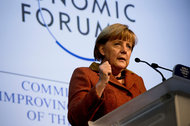 Anja Niedringhaus/Associated PressAngela Merkel, the chancellor of Germany, said recent moves had calmed markets but had not solved the euro zone’s underlying economic problems.
Anja Niedringhaus/Associated PressAngela Merkel, the chancellor of Germany, said recent moves had calmed markets but had not solved the euro zone’s underlying economic problems.
DAVOS, Switzerland — Angela Merkel, the German chancellor, on Thursday warned her fellow euro zone leaders not to falter in their efforts to reinvigorate their economies now that they face less pressure from financial markets. She gave voice to widespread concern here that a tentative European recovery could be undercut by political complacency.
Measures in recent months by the European Central Bank to help banks and struggling euro zone countries have calmed markets but have not solved the euro zone’s underlying economic problems, Ms. Merkel said in a speech to participants at the World Economic Forum.
“The E.C.B. has done a lot,” she said. Now, she added, “there is a political duty for us to do our homework.”
World Economic Forum in Davos
View all posts
Reprising the role of European taskmaster for which she is often resented, Ms. Merkel made her remarks shortly after Mario Monti, the prime minister of Italy, assured an audience at an auditorium in Davos that his country was making progress in efforts to reduce its debt load and streamline its economy. Italy is removing barriers to competition, rebuilding infrastructure and dismantling labor regulations that inhibit hiring and firing, Mr. Monti said.
But among big investors, many of whom are here, there is skepticism over whether Europe’s political leaders will follow through on such changes.
“These are fairly important measures,” said Olivier Marchal, managing director for Europe at Bain Company, speaking on European reform efforts. But, he predicted, “apart from the psychological effect, there will not be any tangible impact before 2014.”
David Cameron, the British prime minister, has intensified pressure on the euro zone — the 17 European Union members that use the euro — with his announcement Wednesday that he would ask Britons to vote on European Union membership within five years. He amplified those remarks here Thursday, saying that Britain did not want to turn its back on Europe but wanted to make it “more competitive, open and flexible.”
The discussion about European competitiveness came after a business survey released in London on Thursday raised hopes that the euro zone could emerge from recession sooner than expected. But the survey of purchasing managers, by the data provider Markit, showed a sharp divergence among countries. While German managers became more optimistic, French sentiment slumped.
Separately, a report from Madrid on Thursday showed that Spanish unemployment rose to a record high of 26 percent at the end of 2012, with six million people out of work.
Mr. Marchal of Bain Company said many of the businesspeople he had talked with remained cautious and reluctant to invest. “Many of them are either postponing strategic moves or preparing for things to get worse,” he said.
During her speech, Ms. Merkel described herself as “conditionally optimistic” and said, “The investment climate in Europe has improved.” But she went on to lament the high level of youth unemployment. The Spanish data released Thursday showed that the jobless rate among people from 16 to 24 years old was 55 percent in the last three months of 2012, up from 52 percent in the previous quarter.
“Our biggest burden is youth unemployment,” she said.
Europe needs to better exploit its status as the world’s largest market, Ms. Merkel said. “We can make a lot of that if we remain open, innovative and when we don’t take it for granted that Europe has a right to be the leading continent on the world.”
While Germany is considered healthier than other large economies in Europe, growth is hardly dynamic. Output shrank in the last three months of 2012. This year, the German economy will grow by about 1 percent, according to numerous forecasts.
“Things are better,” Thomas J. Donohue, president of the United States Chamber of Commerce, said in an interview here. “But there’s a big distance between things being better and having the growth we need to start hiring people.”
Mr. Donohue noted that the United States, Europe and China had become highly dependent on trade with one another. “If the E.U. has even a little bit of negative growth, that’s not going to be good for any of the three of us,” he said.
Ms. Merkel praised Mario Draghi, the president of the European Central Bank, for insisting that countries improve economic performance as a condition for his help containing market pressure.
But many of the business managers who predominate among the attendees in Davos are worried that progress will stall because of resistance from interest groups that stand to lose quasi-monopolies or other privileges ensured by government regulation. In addition, they say, European labor unions have held up changes in laws that make it nearly impossible to dismiss workers who are not needed or not performing.
Mr. Monti’s reform drive has helped Italy win back international respect, but there is considerable nervousness about what will happen after elections in February. Because Italian borrowing costs have retreated from alarming highs last year, political leaders feel more heat from voters than they do from bond investors.
Since Mr. Draghi promised last year to do whatever it took to preserve the euro, “I have seen in no country hard new measures,” Maximilian Zimmerer, chief financial officer of the German insurer Allianz, said in an interview.
Mr. Zimmerer expressed optimism that reforms would resume, but added, “You do not have the pressure of markets for now.”
Article source: http://dealbook.nytimes.com/2013/01/24/in-davos-merkel-presses-leaders-to-keep-focus-on-economy/?partner=rss&emc=rss
